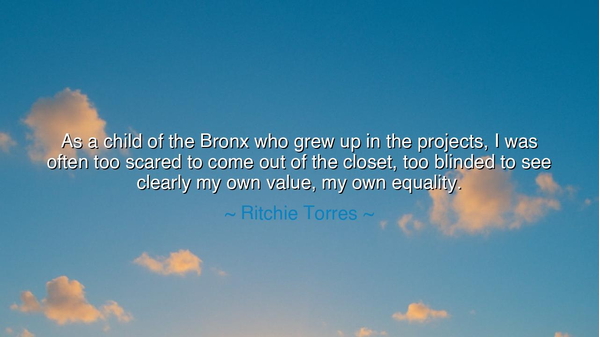
As a child of the Bronx who grew up in the projects, I was often
As a child of the Bronx who grew up in the projects, I was often too scared to come out of the closet, too blinded to see clearly my own value, my own equality.






In the quiet yet powerful confession of Ritchie Torres, we hear the echo of countless souls who have struggled to recognize their own worth: “As a child of the Bronx who grew up in the projects, I was often too scared to come out of the closet, too blinded to see clearly my own value, my own equality.” These words, though personal, transcend one man’s life—they speak to the ancient and universal battle within every human heart: the struggle to see oneself as worthy when the world has told you otherwise. In his voice, there is both pain and triumph, for from his fear grew understanding, and from understanding, the strength to claim his truth. His story is not just about identity, but about the journey from fear to freedom, from blindness to self-illumination.
Born in the Bronx, one of the most vibrant yet challenging corners of America, Torres grew up surrounded by hardship and resilience. The projects were a place of struggle, where poverty, prejudice, and survival intertwined. In such an environment, to be different—to be gay, to be sensitive, to question—was to carry a burden of silence. His words reveal that the oppression of the outer world often becomes the prison of the inner world. Many who are marginalized by society learn to turn that rejection inward, mistaking the world’s cruelty for a reflection of their own unworthiness. In acknowledging this, Torres gives voice to a truth that countless before him have lived but few have spoken: that the hardest fight is not against others, but against the shadow of shame within.
The ancients, too, knew this struggle well. In the myths of every civilization, there are stories of the hidden self, the divine spark buried beneath fear and doubt. Think of Socrates, condemned for speaking the truth he saw within himself; or of Moses, who fled from his destiny because he feared he was unworthy to lead his people. And think of Helen Keller, born blind and deaf, yet who discovered light and meaning through perseverance and faith in her own mind. Like Torres, they all teach that the path to freedom begins with seeing oneself clearly, even when the world would prefer you remain unseen. The mirror of truth is not found in others’ approval, but in one’s own acceptance.
To be blinded to one’s value, as Torres says, is to live without the light of self-recognition. It is to walk in a fog of imposed limits and learned silence. But when that fog begins to lift—when a person begins to see their equality not as a gift granted by others, but as an inherent truth of existence—then the chains of fear begin to fall away. That is the moment when life changes course, when the soul, long bent under the weight of rejection, begins to stand upright once more. Such awakening is not easy; it requires courage greater than the sword, for it demands that one confront their own reflection and declare, “I am enough.”
Torres’s journey is a reminder that equality is not merely a matter of law, but of spirit. A people can be given rights, yet still feel unworthy to claim them. A person can walk in daylight, yet remain captive to the shadows of their past. True liberation comes not only from justice in society, but from acceptance within oneself. And when one who was once afraid rises up and embraces their full identity, their courage becomes a light for all who still dwell in darkness. In this way, Torres’s story is not only his own—it belongs to every soul who has ever hidden, waiting for the moment when they could finally breathe freely.
Consider, too, the lesson of the Civil Rights Movement, when those long oppressed had to look into the mirror of their humanity and remember what the world had tried to make them forget. Dr. Martin Luther King Jr. spoke not only to the injustice of laws, but to the dignity of the spirit. He said that every man, woman, and child bears the image of the divine—that equality is not a privilege to be earned, but a birthright to be lived. Ritchie Torres, standing on that same moral foundation, reminds us that equality begins not in the courtrooms or congresses of men, but in the chambers of the human heart.
And so, let this truth be passed down to all generations: Know thy worth, for the world cannot define it. The circumstances of your birth do not determine the height of your destiny. Whether born in the palaces of kings or the projects of the Bronx, your soul carries the same eternal light. Do not hide that light behind fear or shame, for it was not given to be buried, but to shine. Be patient with your journey, but relentless in your becoming.
When you walk through the world, remember the story of Ritchie Torres, the boy who once hid in silence and became a voice for those still unseen. Let his example awaken you to your own truth: that your value does not need permission, and your equality was never in question—it was written into your very being. And when you find that courage to live as you truly are, you too will find, as he did, that what once blinded you can become the very light that leads you home.






AAdministratorAdministrator
Welcome, honored guests. Please leave a comment, we will respond soon